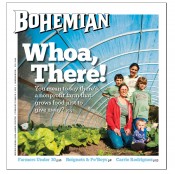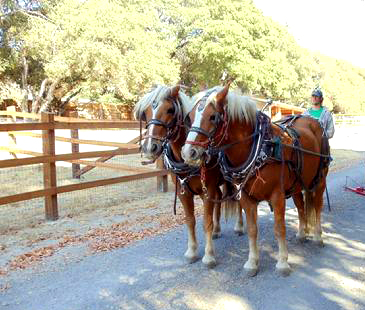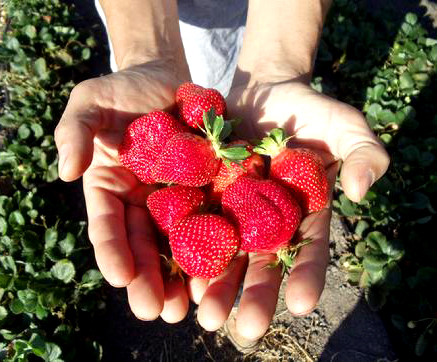Waldorf News
Best Food Money Can’t Buy: While most poor families get the world’s leftovers, WHOA Farm grows organic food specifically to be given away

By JESSICA DUR TAYLOR
Our mission is to produce the best and healthiest food possible and deliver it free of charge to people who cannot afford the high price of organic food commanded by retail outlets. Work Horse Organic Agriculture, Inc. (WHOA) is a 501(c)(3) non-profit that was established to promote the use of draft horse farming to support sustainable and organic agriculture in Sonoma County. All food grown by WHOA is given away to organizations in Sonoma County that serve people who do not have access to fresh organic produce.
At the Santa Rosa Health Center in Roseland, 50 percent of Dr. Patricia Kulawiak’s adolescent patients are obese. “There is an epidemic of diabetes in this area,” Kulawiak tells me over the phone, “and since good, healthy food is expensive, poverty severely limits your options.”
Thanks to the Work Horse Organic Agriculture (WHOA) Farm, dozens of these families receive bags of fresh, organic produce every week—for free.
Started two years ago by Eddie and Wendy Gelsman, WHOA Farm’s motto is “The best food money can’t buy,” a tidy summation of their mission to provide fresh, organically grown food to those who can’t afford it. “It’s not a crime to be poor,” says Eddie. “Everyone has the right to eat well.”
 Located on 16 acres on Petaluma Hill Road, WHOA Farm began with six months’ worth of nonprofit application paperwork and a few raised beds, which the Gelsmans cultivated themselves. In January of 2012, they hired young farmers Balyn and Elli Rose to live on the property and run the farm, which, as the name indicates, is one of the few in the area that harnesses the power of draft horses to plow the fields. “Horses,” says Wendy, “are the ultimate piece of the sustainability puzzle.”
Located on 16 acres on Petaluma Hill Road, WHOA Farm began with six months’ worth of nonprofit application paperwork and a few raised beds, which the Gelsmans cultivated themselves. In January of 2012, they hired young farmers Balyn and Elli Rose to live on the property and run the farm, which, as the name indicates, is one of the few in the area that harnesses the power of draft horses to plow the fields. “Horses,” says Wendy, “are the ultimate piece of the sustainability puzzle.”
Even though they were just a few weeks from having their first child, and even though they had never before worked with draft horses, the offer to work on the farm “was an opportunity we just couldn’t pass up,” says Elli, who met Balyn in an agro-ecology class at UC Santa Cruz, where they both graduated in environmental studies.
“They are two highly educated and highly skilled agriculturalists,” Eddie says of the couple, who prior to WHOA ran a farm and CSA program called Wild Rose Ranch for four years.
Together with Dan Evans, the only other full-time WHOA Farm employee, the Roses grew and donated 15,000 pounds of organic produce, 876 baskets of strawberries and 556 dozen eggs to health clinics and food banks across Sonoma County last year. (According to Cathryn Couch of the Ceres Community Project, WHOA provided $14,000 worth of food to their organization alone.)
While plenty of farms and supermarkets donate their leftover produce once it is no longer marketable, WHOA is unique in its practice of growing food specifically to give away. Produce is harvested in the morning and delivered that same afternoon in order to “give people food with the highest nutritional value,” says Eddie.
 Anyone who’s ever inherited a surplus of fennel or radicchio understands that fresh produce is a wonderful thing—as long as you know what to do with it. Which is why education is at the heart of WHOA’s mission. “We are committed to giving away food responsibly,” explains Wendy, “which means that we want people to be comfortable with the produce and understand the nutritional value of what they’re eating.”
Anyone who’s ever inherited a surplus of fennel or radicchio understands that fresh produce is a wonderful thing—as long as you know what to do with it. Which is why education is at the heart of WHOA’s mission. “We are committed to giving away food responsibly,” explains Wendy, “which means that we want people to be comfortable with the produce and understand the nutritional value of what they’re eating.”
To that end, health centers in Santa Rosa and West County offer nutrition classes (some taught by Ceres) in which patients learn how to turn things like kale and rutabaga into healthy, delicious meals. All who attend—many of them at-risk, uninsured and low-income—are given a bag filled with WHOA produce to take home.
Ever ambitious, the Gelsmans want to do even more. “Our goal is to be able to give away teams of draft horses to young farmers,” says Eddie, whose plans for WHOA also include hosting educational workshops and internships. Of course, nothing is possible without funding. In addition to private donations, grants, fundraisers, monthly volunteer days, and an outreach booth at the Santa Rosa farmers market—where customers receive a jar of Elli’s sauerkraut or fruit preserves for a ten-dollar donation—WHOA is also cultivating creative financial solutions.
The Gelsmans are leasing the Crane family’s 11-acre vineyard (conveniently situated smack-dab in the middle of WHOA’s property), and with the generous help of winemakers Guy and Judy Davis, will soon make WHOA Pinot Noir. Beginning in the fall of 2014, they hope to sell 600 to 800 cases annually, which could provide over 50 percent of WHOA’s operating budget.
On a recent Friday afternoon, I walk around the farm with Elli and 11-month-old Olivia, who mimicked the sound of the hens clucking outside their mobile chicken coop; every couple of days they move it to fresh, new grass. Using expert Doc Hammill’s “gentle horsemanship” approach, Balyn, who calls this his “ideal job,” harnesses Chip and Mark, whose shiny blonde manes and tails belie their dude-like monikers.
The Gelsmans’ vision is evident in the green fields of oat hay shimmering in the winter sunlight. After conditioning the soil for spring planting, the hay will be harvested and fed to the horses, who will then plow the fields where onions, lettuce and parsley sprouts will soon take root. And come September, a patient at the Santa Rosa Health Center will discover the spicy kick of mustard greens or the surprising sweetness of a just-picked carrot.
“By honoring the people who are used to getting the leftovers,” Dr. Kulawiak says, “WHOA is working to dismantle health disparities. They are helping people make changes that will last for generations.”
This article originally appeared in the Bohemian. To view the article at source, click here.
Eddie and Wendy Gelsman are a Summerfield Waldorf School and Farm family. Learn more about Summerfield Waldorf School and Farm here.
Summerfield Waldorf School and Farm of Santa Rosa began in 1974. In 1980, the school purchased a 32-acre horse farm, the school’s current location. From the beginning there was an intention to have a working biodynamic farm as part of the school initiative. Their environmental land ethic is a wonderful expression of the relationship that they have created with the land, the school and the farm over the years.
Environmental Land Ethic of the School
Following is our current Environmental Land Policy, adopted by the Board of Directors in 2011.
Summerfield Waldorf School and Farm is committed to responsible stewardship of our environment. We appreciate and respect the interdependence of complex human and ecological systems and are committed to maintaining and improving their health, wholeness, balance and diversity while advancing sustainability on the Summerfield campus in several areas of operation: resource use and recycling, energy consumption and generation, land use, farming and landscape, education and student involvement, built environment, transportation, water, and food.
In the course of our activities, we shall;
- Reduce our use of natural resources;
- Support the sustainable production of the resources we must use by purchasing renewable, reusable, recyclable, and recycled materials;
- Seek locally sourced materials and goods;
- Minimize our use of toxic substances, seek safe alternatives, and ensure that unavoidable use is in full compliance with environmental regulations;
- Reduce the waste we generate and promote strategies to reuse and recycled those wastes that cannot be avoided;
- Maintain the biodynamic practices of our farm;
- Protect, maintain, restore and experience the natural wildlife areas of our school;
- Protect the neighboring Laguna de Santa Rosa: an internationally recognized Ramsar Convention wetland;
- Reduce green house gas emissions;
- Reduce the impacts of transportation to and from school by promoting activities like car pooling and bicycling.
- Integrate knowledge of and stewardship of our environment into the curriculum at SWSF.
Summerfield Waldorf School and Farm is committed to sharing information about sustainability practices, especially those that are replicable, within our school and with other school communities; and when appropriate, to share with local, regional, national and global organizations in order to foster widespread environmental stewardship and sustainability. We are committed to learning the best practices from other schools and organizations as we work to continually improve our own sustainability efforts.
 Bringing Love to Learning for a Lifetime
Bringing Love to Learning for a Lifetime Quality Education in the Heartland
Quality Education in the Heartland
 Waldorf-inspired Homeschool Curriculum
Waldorf-inspired Homeschool Curriculum Flexible preparation for your new grade
Flexible preparation for your new grade Summer Programs - Culminating Class Trips
Summer Programs - Culminating Class Trips Full-Time Teacher Education
Full-Time Teacher Education Middle School Science With Roberto Trostli
Middle School Science With Roberto Trostli Everything a Teacher Needs
Everything a Teacher Needs Roadmap to Literacy Books & Courses
Roadmap to Literacy Books & Courses Immersive Academics and Arts
Immersive Academics and Arts Train to Teach in Seattle
Train to Teach in Seattle Waldorf Training in Australia
Waldorf Training in Australia Apply Today: New Cohort Starts Nov. 2025
Apply Today: New Cohort Starts Nov. 2025 The Journey is Everything
The Journey is Everything Jamie York Books, Resources, Workshops
Jamie York Books, Resources, Workshops Space speaks. Its language is movement.
Space speaks. Its language is movement. ~ Ensoul Your World With Color ~
~ Ensoul Your World With Color ~ Bay Area Teacher Training
Bay Area Teacher Training Transforming Voices Worldwide
Transforming Voices Worldwide Association for a Healing Education
Association for a Healing Education Great books for Waldorf Teachers & Families
Great books for Waldorf Teachers & Families Caring for All Stages of Life
Caring for All Stages of Life RSS Feeds
RSS Feeds